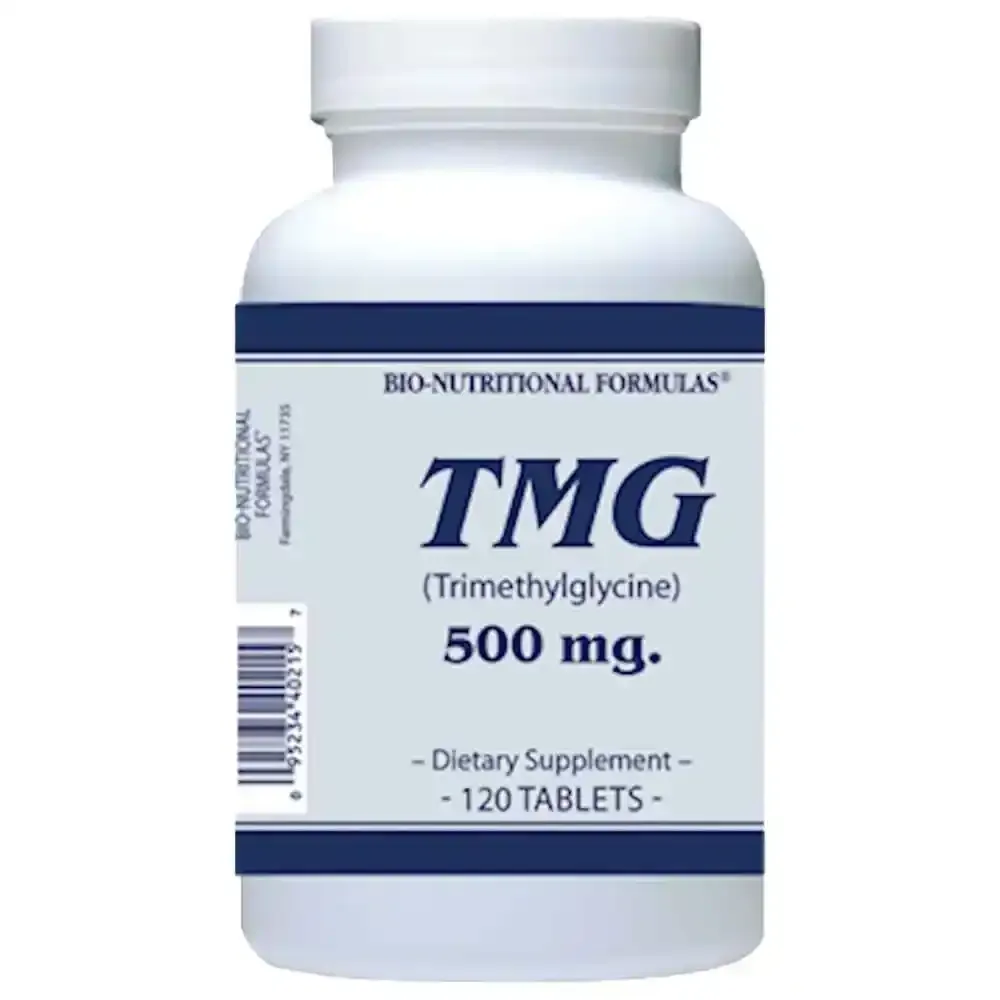Bio-Nutritional Formulas – TMG 500mg (120 Tablets)
Bio-Nutritional Formulas – TMG 500mg (120 Tablets)
TMG (Trimethylglycine), also known as betaine, is a natural methyl donor that plays a vital role in methylation processes in the body. Methylation is essential for detoxifying homocysteine, which at elevated levels can be associated with cardiovascular risks.
In this process, TMG donates a methyl group to homocysteine, converting it into methionine, an important amino acid involved in numerous metabolic functions. After donating the methyl group, TMG is transformed into Dimethylglycine (DMG), which supports energy production and overall metabolic health.
This pathway highlights the importance of adequate methyl donors like TMG in maintaining homocysteine balance and supporting cellular function.
Ingredients and Specifications
| Ingredient | Amount |
|---|---|
| Betaine Anhydrous | 500 mg |
| Trimethylglycine (TMG) | 500 mg |
| Amino Acid | _ |
| Beet | _ |
Other Ingredients: Rice, silica, magnesium stearate, gelatin cap.
Amount Per Serving -
Trimethylglycine (amino acid, from beets): 500 mg
Suggested Use:
Serving size: 1 Tablet
Servings per container: 120
Take two (2) tablets daily with or between meals.
Guarantees:
Free of Betaine Hydrochloride found in some products claiming to be TMG, corn, soy, yeast, wheat, egg, sugar, salt, starch, milk, artificial color, flavor or preservatives
Warnings
Consult your healthcare provider before use if you are pregnant, nursing, taking medications, or have a medical condition. Discontinue if adverse reactions occur. Keep out of reach of children.
*These statements have not been evaluated by the Food and Drug Administration. This product is not intended to diagnose, treat, cure, or prevent any disease.
If you are interested in getting program recommendations from an Herbalist, click here to submit the client questionnaire.
Frequently Asked Questions (FAQ)
Q1: What is TMG (Trimethylglycine) and what does it do?
A: TMG, also known as betaine, is a natural methyl donor that supports methylation processes in the body. It helps detoxify homocysteine, promotes healthy cardiovascular function, and supports energy production and overall metabolic health.
Q2: How does TMG help with homocysteine levels?
A: TMG donates a methyl group to homocysteine, converting it into methionine, an essential amino acid. This process helps maintain healthy homocysteine levels, which is important for cardiovascular health.
Q3: How many servings are in each container?
A: There are 120 servings per container.
Q4: Is this product gluten-free or allergen-free?
A: The product is free from common allergens like wheat, soy, yeast, egg, and artificial preservatives. However, please check the label for any specific allergen information or consult your healthcare provider if you have allergies.
Q5: Are there any clinical or non-clinical studies supporting the benefits of TMG Betaine supplementation?
Yes. Multiple clinical and non-clinical studies have explored the role of TMG (Betaine) in supporting healthy homocysteine levels. Research published in journals such as the American Journal of Clinical Nutrition and studies reviewed by organizations like the Linus Pauling Institute have shown that TMG supplementation can help maintain homocysteine within a healthy range. These findings support the use of TMG as part of a balanced regimen for overall cardiovascular and metabolic health.
Q6: How does TMG Betaine support liver health?
TMG Betaine plays a key role in supporting healthy liver function through its involvement in methylation. By donating a methyl group, TMG helps facilitate critical processes in the liver—such as detoxification and lipid metabolism. This means it assists the body’s natural mechanisms for processing harmful substances and managing fats, both of which are essential for maintaining optimal liver health. Additionally, by helping convert homocysteine into methionine, TMG reduces strain on the liver and promotes balanced metabolic activity.
Q7: What is homocysteine, and why is it important to manage its levels?
Methylation is essential for detoxifying homocysteine, which at elevated levels can be associated with cardiovascular risks.
In this process, TMG donates a methyl group to homocysteine, converting it into methionine, an important amino acid involved in numerous metabolic functions. After donating the methyl group, TMG is transformed into Dimethylglycine (DMG), which supports energy production and overall metabolic health.
This pathway highlights the importance of adequate methyl donors like TMG in maintaining homocysteine balance and supporting cellular function.
Why is this important?
Methylation is a fundamental biological process, vital for DNA repair, liver detoxification, lipid metabolism, and the synthesis of SAMe (S-adenosylmethionine), a compound essential for mood and cellular health. By supporting the conversion of homocysteine—a potentially harmful amino acid—into the much friendlier methionine, TMG helps maintain healthy homocysteine levels already within the normal range. Both clinical and non-clinical studies suggest that adequate TMG intake can play a key role in promoting cardiovascular and metabolic wellness.
Q8:What is the function of methylation in the body, and why is it important?
TMG (Trimethylglycine), also known as betaine, is a natural methyl donor that plays a vital role in methylation processes in the body. Methylation is essential for detoxifying homocysteine, which at elevated levels can be associated with cardiovascular risks.
In this process, TMG donates a methyl group to homocysteine, converting it into methionine, an important amino acid involved in numerous metabolic functions. After donating the methyl group, TMG is transformed into Dimethylglycine (DMG), which supports energy production and overall metabolic health..
This pathway highlights the importance of adequate methyl donors like TMG in maintaining homocysteine balance and supporting cellular function.

